
What is Dividend?
A dividend is a distribution of a portion of a company's earnings to its shareholders. Typically, dividends are paid out in the form of cash, but they can also be issued as additional shares of stock or other property.Types of Dividend
Dividends can be categorized in several ways. Regular dividends distributed from a company's earnings are called profit dividends, whereas dividends issued from capital are referred to as liquidation dividends. Additionally, dividends can be classified based on the medium in which they are distributed.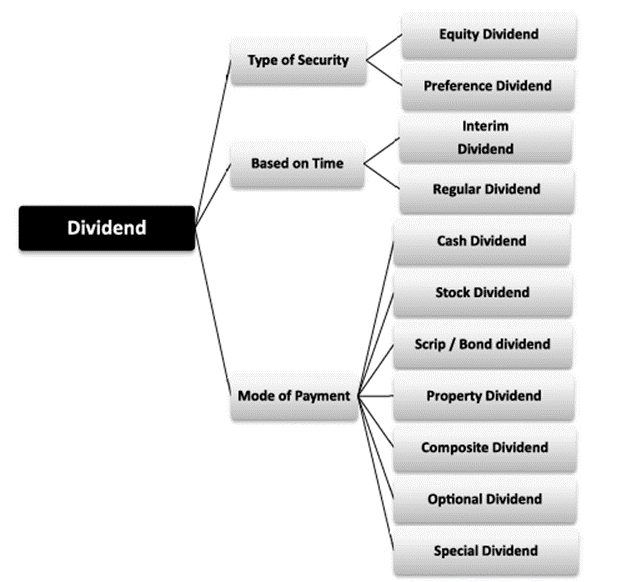
- Equity Dividend: Paid on equity shares, set by the board and approved by shareholders.
- Preference Dividend: Paid on preference shares, fixed at issuance, prioritized over equity dividends.
- Interim Dividend: Paid before year-end accounts are closed, based on heavy earnings during the year.
- Regular Dividend: Paid at a usual rate, preferred by investors seeking consistent income.
- Cash Dividend: Paid in cash, resulting in outflow of funds, preferred by ordinary shareholders.
- Stock Dividend: Bonus shares issued to existing shareholders, conserves cash, capitalizes earnings.
- Scrip or Bond Dividend: Promises future payment, issued when cash is insufficient, bears interest.
- Property Dividend: Paid in assets other than cash, rare in India.
- Composite Dividend: Paid partly in cash and partly in property.
- Optional Dividend: Shareholders choose between cash or property dividend.
- Extra or Special Dividend: Abnormal, non-recurring dividend, declared from good profits or reserves without adjusting the regular rate.
Determinants Of Dividend Policy
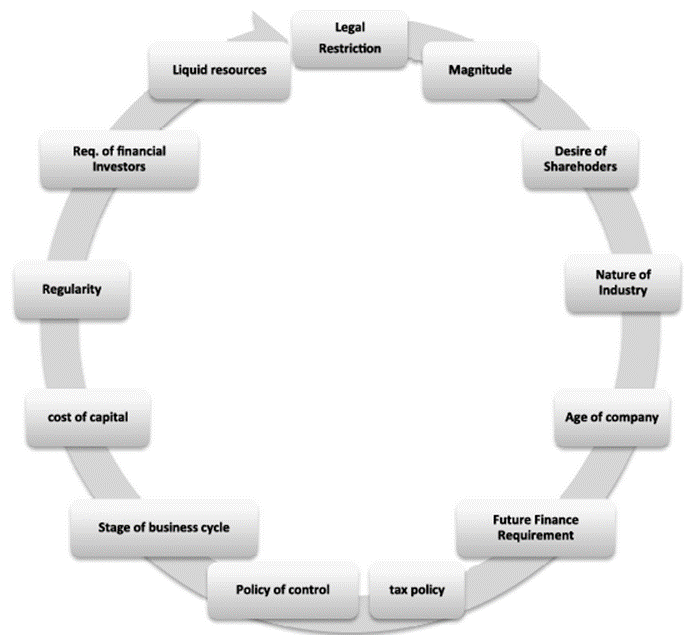
Types Of Dividend Policy
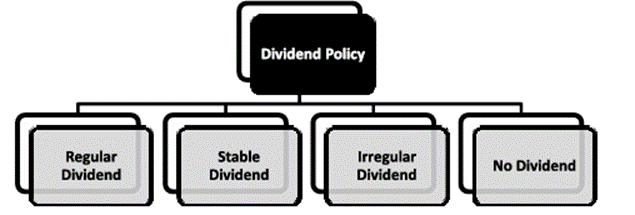 1- Regular Dividend Policy:
In this type of dividend policy the investors get dividend at usual rate. Here, the
investors are usually persons who want to get regularly incomes. This type of dividend
payment can be maintained only if the company has regular earnings.
2- Stable dividend policy:
Here the payment of certain sum of money is regularly made to the shareholders.
It is of three types:
1- Regular Dividend Policy:
In this type of dividend policy the investors get dividend at usual rate. Here, the
investors are usually persons who want to get regularly incomes. This type of dividend
payment can be maintained only if the company has regular earnings.
2- Stable dividend policy:
Here the payment of certain sum of money is regularly made to the shareholders.
It is of three types:
- Constant dividend per share: In this case, reserve fund is created to pay fixed amount of dividend in the year when the earning of the company are not enough. It is suitable for the firms having stable earning.
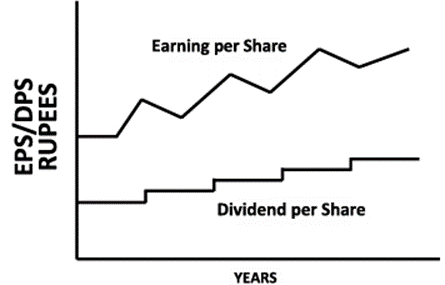
- Constant payout ratio: Under this type the payment of fixed percentage of earning is paid as dividend every year.
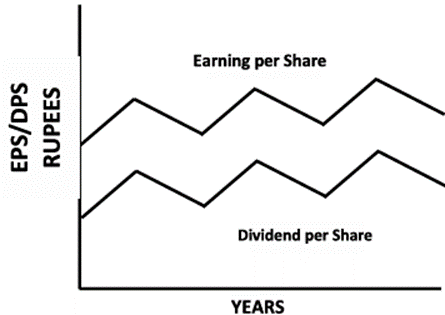
- Stable rupee dividend + extra dividend: Under this type, there is payment of low dividend per share constantly + extra dividend in the year when the company earns high profit. The extra dividend may be considered as a “bonus” paid to the shareholders as a result of a usually good year for the firm. This additional amount of dividend may be paid in the form of cash or bonus shares, subject to the firm’s liquidity position.
Also Check: What is Costing? Operational Approach to Financial Decision
3- Irregular dividend: As the name suggests here the company does not pay regular dividend to the Shareholders. The company uses this practice due to following reasons:-
- Due to uncertain earning of the company.
- Due to lack of liquid resources.
- The company is sometime afraid of giving regular dividend.
- Due to uncertainty of business.
Dividend Theories / Dividend Models
Relationship between Dividend Policy and Value of Firm: Dividend decision is a financial decision. There are conflicting theories regarding the impact of dividend decisions on the valuation of a firm. For the sake of convenience, these theories can be grouped into the following two categories:

Irrelevant concept of Dividend
Modigliani and Miller’s Approach (M.M. Approach) According to Modigliani and Miller (M-M), a firm's dividend policy does not influence its valuation. They asserted that a firm's value is driven by its earning potential and investment strategy, rather than its income distribution method. In ideal capital markets, characterized by rational investors and no tax preference between dividends and capital gains, dividend decisions do not affect the share market price. Essentially, M-M's theory posits that in perfect market conditions, investors are indifferent between receiving returns via dividends or capital gains, as both are considered equivalent. Consequently, dividend policy has no impact on shareholder wealth or the firm's overall value. Assumptions of M-M Hypothesis:- Perfect Capital Markets: This assumption implies that information is freely available to all investors, transaction and floatation costs do not exist, and no single investor is large enough to influence market prices.
- Rational Investor Behavior: It assumes that investors behave rationally, meaning they make decisions based on maximizing their utility or wealth.
- Tax Neutrality: The hypothesis assumes either no taxes exist or there are no differences in tax rates between dividends and capital gains. In other words, investors view dividends and capital gains equally in terms of taxation.
- Fixed Investment Policy: The firm's investment policy is assumed to be fixed, meaning it does not change over time.
- Certainty and No Risk: It assumes that there is no risk or uncertainty in the market. Investors are able to accurately forecast future prices and dividends with certainty. Additionally, it assumes that a single discount rate is appropriate for valuing all securities over time periods.
Relevant concept of Dividend
Walter’s Approach Professor James E. Walter has developed a theoretical model which shows the relationship between dividend policies and common stock prices.Walter’s model is based on the following assumptions:
- The firm finances all investment through retained earnings; that is debt or new equity is not issued;
- The firm’s internal rate of return (r), and its cost of capital (k) are constant;
- All earnings are either distributed as dividend or reinvested internally immediately.
- Beginning earnings and dividends never change. The values of the earnings per share (E), and the dividend per share (D) may be changed in the model to determine results, but any given values of E and D are assumed to remain constant forever in determining a given value.
- The firm has a very long or infinite life.
- The firm is an all equity firm.
- No external financing is available. Only retained earnings will be used to financing expansion.
- The internal rate of return is constant.
- The cost of capital (or discount rate) for the firm remains constant and it is greater than the grow rate, i.e., CR > br (or g).
- The retention ratio, b, once decided upon, is constant.
- The firm and its stream of earnings are perpetual. Thus, the growth rate, g = br, is constant for ever.
- The corporate taxes do not exist.
Dividend FAQs
What is the difference between regular and special dividends?
Regular dividends are paid at a usual rate, providing consistent income to investors. Special dividends, however, are irregular and issued from exceptional profits or reserves, exceeding regular payouts.
How do companies decide on dividend policies?
Companies consider earnings stability, growth needs, and shareholder expectations when setting dividend policies.
Why might a company choose not to pay dividends?
Reasons include reinvesting profits for growth, uncertain earnings, or strategic objectives.
How does dividend policy impact shareholder wealth?
Different policies can affect shareholder perceptions of stability and growth potential.
How should investors interpret a company's dividend policy?
It reflects financial health, management confidence, and long-term strategies for investors.
Talk to a counsellorHave doubts? Our support team will be happy to assist you!

Check out these Related Articles
Free Learning Resources
PW Books
Notes (Class 10-12)
PW Study Materials
Notes (Class 6-9)
Ncert Solutions
Govt Exams
Class 6th to 12th Online Courses
Govt Job Exams Courses
UPSC Coaching
Defence Exam Coaching
Gate Exam Coaching
Other Exams
Know about Physics Wallah
Physics Wallah is an Indian edtech platform that provides accessible & comprehensive learning experiences to students from Class 6th to postgraduate level. We also provide extensive NCERT solutions, sample paper, NEET, JEE Mains, BITSAT previous year papers & more such resources to students. Physics Wallah also caters to over 3.5 million registered students and over 78 lakh+ Youtube subscribers with 4.8 rating on its app.
We Stand Out because
We provide students with intensive courses with India’s qualified & experienced faculties & mentors. PW strives to make the learning experience comprehensive and accessible for students of all sections of society. We believe in empowering every single student who couldn't dream of a good career in engineering and medical field earlier.
Our Key Focus Areas
Physics Wallah's main focus is to make the learning experience as economical as possible for all students. With our affordable courses like Lakshya, Udaan and Arjuna and many others, we have been able to provide a platform for lakhs of aspirants. From providing Chemistry, Maths, Physics formula to giving e-books of eminent authors like RD Sharma, RS Aggarwal and Lakhmir Singh, PW focuses on every single student's need for preparation.
What Makes Us Different
Physics Wallah strives to develop a comprehensive pedagogical structure for students, where they get a state-of-the-art learning experience with study material and resources. Apart from catering students preparing for JEE Mains and NEET, PW also provides study material for each state board like Uttar Pradesh, Bihar, and others
Copyright © 2026 Physicswallah Limited All rights reserved.









